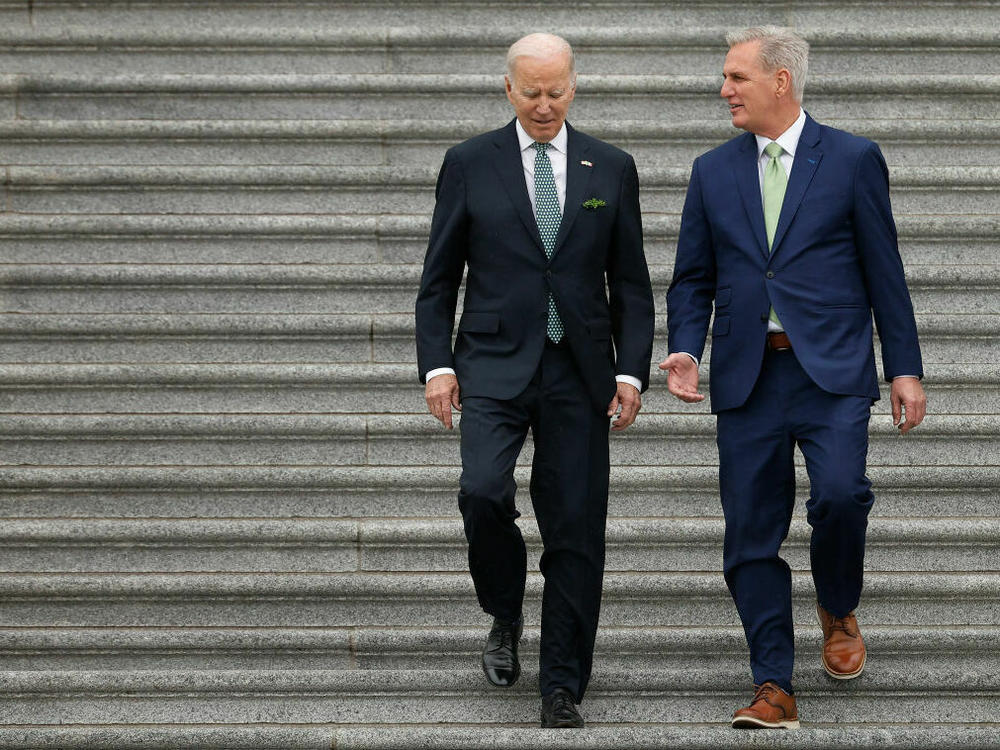Section Branding
Header Content
Republicans hope McCarthy's bill gives him leverage in debt ceiling standoff
Primary Content
Updated April 28, 2023 at 11:18 AM ET
With the clock ticking on the debt ceiling debate, House Republicans have narrowly passed a bill that they hope will bring President Biden to the negotiating table.
The bill would raise the debt ceiling while cutting federal spending — things Democrats are vehemently opposed to linking — and threatens to unravel parts of Biden's domestic agenda.
It's not likely to advance further, since Senate Democrats have labeled key provisions "nonstarters" and the White House says Biden would veto it.
But it could increase pressure on Biden to start talking about compromises, since neither party wants to default on the national debt. Biden and House Speaker Kevin McCarthy haven't had an extended discussion about it since February. Biden and the White House have insisted that raising the debt limit be kept separate from talks about spending cuts.
So far, the White House is holding firm.
McCarthy has a fair amount of leverage at this point, says Julian Zelizer, a professor of political history at Princeton University.
"He's now put forth a pretty big package of spending cuts and that becomes the focus of the debate," Zelizer explains. "They're specific spending cuts, and so now Biden has this in front of him and it's more than an amorphous discussion.
Democrats argue that raising the debt ceiling — in order to avoid defaulting, which could sink the U.S. economy and roil global financial markets — shouldn't be subject to partisan politics, and that they shouldn't have to make concessions to Republicans just to finance spending they've already committed.
Zelizer agrees with that argument, but says as long as Republicans are willing to follow through, there's a potential for a default unless Biden takes "extraordinary measures," like using the 14th amendment to pay the government's bills.
"If he's not willing to do that, he doesn't have as much leverage, I think, as some Democrats hope," he adds. " And he might have to concede to some of these spending cuts to get the bill through."
Zelizer spoke with Morning Edition's Steve Inskeep about the recent precedents and power dynamics at play.
This interview has been edited and condensed for clarity.
Interview highlights
On the idea that House Republicans are driving McCarthy
That's been clear from day one, that the caucus controls him rather than him leading the caucus. They have made it crystal clear that this debt ceiling fight is serious and that they're willing to go through with the ultimate threat of not raising the debt ceiling. And so McCarthy doesn't have much wiggle room not to listen to them at this point.
On what Biden can learn from the 2011 debt ceiling standoff
[President Barack] Obama made concessions on spending cuts in the end, and so I think we might see a replay of that. I don't know how far Biden is willing to go. This caucus is even more radicalized than the caucus in 2011, so I think the situation is even more fraught than it was in 2011.
On whether Biden could keep refusing to negotiate
He could get involved in one of these faceoffs and hope that the Republicans back down, or more importantly, hope that somehow Senator [Mitch] McConnell comes to the rescue, that somehow within the Republican party that the Senate starts to apply pressure on the House somehow, through carrots and sticks, to back down. But at this point there's no sign that McConnell is going to do that, so if Biden wants to take that step he can, but the risks are very high.
On deeper political significance of the fight
[Biden] can also think of ways around this. But the problem is this shouldn't be something that becomes at the center of these partisan battles from the Republican party, and that's really what the crisis is at this point.
The audio interview was edited by Olivia Hampton.
Copyright 2023 NPR. To see more, visit https://www.npr.org.

